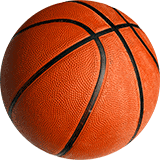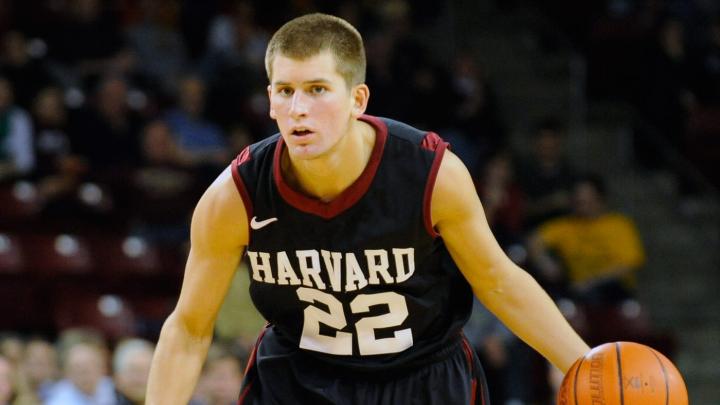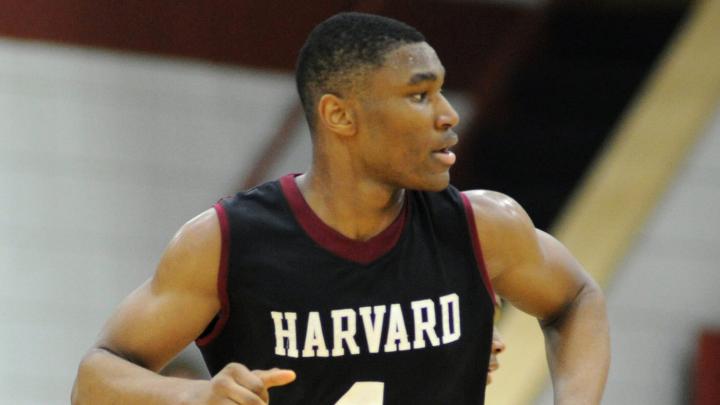When the Harvard men’s basketball team fell to Holy Cross earlier this year, the Crusaders employed an aggressive full-court press that caused the Crimson to turn the ball over 24 times and knocked Harvard out of the Associated Press’s Top -25. The match-up raised questions about the team’s depth and direction. Besides junior point guard Siyani Chambers, who could Harvard turn to as a reliable ball handler? Was the offense excessively dependent on senior Wesley Saunders—and therefore prone to stagnate? Most alarmingly, did this team have the intensity of head coach Tommy Amaker’s recent championship-winning squads?
Yesterday evening against Boston University, Harvard again faced a local foe employing an alternative defense, but this time a Crimson victory continued the season-long process of answering those questions. The Terriers used a two-by-three zone (a team deploys two defenders at the top of the key and three more along the baseline) designed to target another perceived gap in the Harvard arsenal: the absence of reliable three-point shooting. But thanks to stout defense and a strong second half, the Crimson prevailed 70-56. More important, the victory (which improved Harvard’s record to 7-1) concluded a stretch during which the Crimson swept three challenging games, dispatching Northeastern last week, 60-46, before traveling north to Burlington over the weekend to hold off Vermont, 64-52, in double overtime and then BU. (Despite a 2-6 record, BU earlier this season trailed top-ranked Kentucky by only five points at halftime.)
 Harvard Hardwood
Harvard Hardwood
Sign up for Harvard Magazine’s basketball e-mail and follow the Crimson all season long! David L. Tannenwald ’08 will provide the latest news, game summaries, and insights as the Crimson chase another Ivy title and NCAA berth!
Early on against the Terriers, Harvard struggled, trailing 19-14 with roughly 10 minutes left in the first half after Corbin Miller ’15 (’17)—the team’s designated long-range marksman—had missed his first three three-point attempts and Saunders, the team’s leading scorer, had yet to put the ball in the basket. The BU zone, Amaker acknowledged after the game, had “really bothered” the Crimson by causing them to “hurry” several shot attempts and “settle” for several others.
But during the remainder of the game, and especially after intermission, the Crimson took over, thanks in part to defense. In particular, Saunders prevented BU’s best player, Cedric Hankerson, from ever getting a field goal. Harvard also forced several turnovers, which led to easy baskets before the Terriers could set up their zone. And even when BU established its defense, Harvard shot over it: Miller drained three threes during the final three-quarters of the game, and when BU tied the contest at 45 with roughly 11 minutes remaining, Saunders swished a three at the other end with the shot clock for that possession expiring to give Harvard the lead for good.
As Amaker noted following last night’s game, this was a “challenging stretch” for his team. His players are not only preparing for final exams, they are also continuing to learn to play with the requisite intensity when the squad has a “target on its back.” That the Crimson won all three matchups shows it is not the same squad that fell to Holy Cross earlier this season.
Still, the season is young, and the team is still forging its identity. One of the biggest priorities on the court will be establishing a more consistent post game. In what Amaker described as a “spirited” performance, sophomore power forward Zena Edosomwan scored on several post moves (including a powerful dunk) to help keep the team close against BU in the first half. But Harvard’s other big men, including senior center Kenyatta Smith, struggled to finish around the basket. If the team is to play “inside-out” as it prefers, it will need a more robust and consistent offensive presence from its big men.
Off the court, the question is who will demonstrate the leadership to spur on the team against opponents gunning for them As Amaker noted, Harvard has faced this challenge in the past; but it has also had players like Kyle Casey ’13, Laurent Rivard ’14, and Brandyn Curry ’14 who “relished” the opportunity to play under such circumstances. Who will provide that critical intangible on this year’s team?
Harvard will have to discover that quality quickly. After a two-week break for finals, the squad will travel to Charlottesville to take on the University of Virginia, the sixth-ranked team in the country, on December 21. They finish the calendar year with a trip west to face Grand Canyon University and Pac-12 stalwart Arizona State. Just a couple of weeks later, Ivy play begins—with each rival surely aiming to unseat the four-time league champion.
Thus, even though the Crimson will almost certainly face an array of defenses for the rest of the season, its greatest defensive challenge may be internal: how to find the strength and focus to defend its perch atop the Ivy League.
Tidbits: Although the Harvard-Vermont game went to double overtime, the Crimson deserved to win in regulation. With 12:37 left in the second half, the scorekeeper awarded the Catamounts three points for a two-point basket. Had the basket been scored properly, Vermont might have altered its strategy; nonetheless, Harvard technically should have led by one point, and won the game at the end of regulation.
The Crimson has made a strong start, but several other Ivy League teams have scored impressive victories, too. Yesterday Brown knocked off Providence, 77-67, giving the Bears their second victory in three years against the defending Big East champion. Even more impressive: Yale defeated defending national champion UConn, 45-44, last Friday, after senior Jack Montague hit a three-pointer with just under two seconds left. Following the game, Yale star Justin Sears told reporters that the win was the “second best” in his career behind the Elis’ victory over Harvard last year.
Wesley Saunders, who is averaging 20.1 points per game, was named one of 50 players on the watch list for the Naismith Award, recognizing the top collegiate player in the country.








